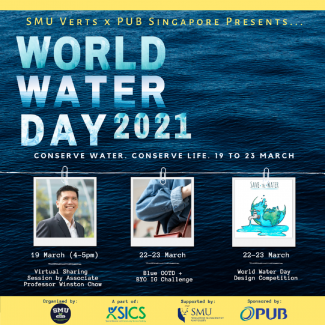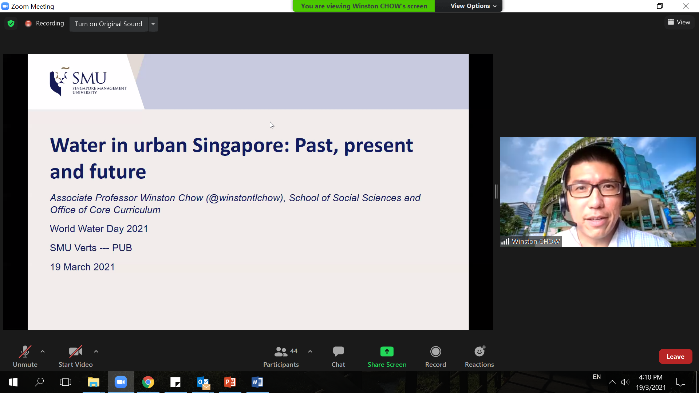
United Nations has officially identified World Water Day to be held annually on 22 March as a means of focusing attention on the importance of freshwater and advocating for the sustainable management of freshwater resources. The theme for World Water Day 2021 is climate change and water security.
In Singapore, led by the Public Utilities Board (PUB), the annual celebration began on 2 March, as a platform to rally the community to celebrate, appreciate and conserve water, and organise events about water. You can watch PUB’s TV commercial which aims to bring the campaign’s key messages to life by visualising the direct effects of climate changes and showcasing PUB’s works in mitigating these effects here.
Over at the Singapore Management University (SMU), the environment sustainability club – SMU Verts have organised three programmes to mark World Water Day this month. These include a talk by an SMU climate scientist, a contest where student participants will need to post photos of themselves wearing blue and practising bring-your-own habits onto their Instagram stories and a design contest on the theme of water conservation and climate change.

Winston Chow, Associate Professor of Science, Technology and Society, School of Social Sciences and Office of Core Curriculum and an expert in climate change and sustainability, was invited to give a talk on Climate Change and Water Resource Management on 19 March 2021 via zoom.
Prof Chow began his talk with a summary of three key takeaways:
- Singapore has come a long way in water resource resilience
- Climate change – especially changing rainfall and sea level rise – is a problem now, and in the future
- Staying resilient needs action from all
He then proceed to poll 50 participants which comprised SMU students, faculty and staff on “When was the last time Singapore had a flood that resulted in loss of life?” and “When was the last time Singapore had nationwide water rationing from drought?”. As expected, not everyone knew the answers which were December 1978 and April 1963 respectively.
Role of Water in Singapore’s Development
Although these events occurred quite long ago, Prof Chow said Singapore’s development has long been shaped by our water supply. He cited a book titled, “The Singapore Water Story” which stated that the journey of Singapore´s development and the fundamental role that water has had in shaping it. What makes this case so unique is that the quest for self-sufficiency in terms of water availability in a fast-changing urban context has been crucial to the way development policies and agendas have been planned throughout the years.
He added that water is our economic lifeblood. The Singapore water story is not just about self-sufficiency and flood protection, but about ensuring that there is sufficient supply of water to meet urban demand from various sectors, and the ability to treat sewerage and sanitation. It is also about a healthy urban watershed where healthy rivers (and sources) that enable ecosystem services – supporting habitats, regulating water quality, providing transport, and areas of cultural heritage and recreation. In addition, Singapore has built strong legal and institutional frameworks and these are essential for decision making and resource management. For example, the 1961 and 1962 water agreement between Malaysia and Singapore were signed and today Singaporeans have access to clean water.
One can claim that Singapore has a successful water story, and this is especially so when related to the United Nations Sustainable Development Goal 6 where we have access to clean water and adequate sanitation and sewerage infrastructure.
How climate disruption affects Singapore’s water
However, Prof Chow cautions that Singapore cannot rest on its laurels as there is an element of surprise from climate change. All around the world ice sheets are melting; heavy rainfall or lack of it leads to floods or droughts and dry spells. The level of warming we will experience ultimately depends on how much greenhouse gases we emit and we are on course for a greater than 3 °C world, even though we aim for a 2 or 1.5 °C future.
With this climate change, sea level rise on Singapore will affect key coastal infrastructure (e.g. sea- and air-ports; water infrastructure) and increase the risk of floods. In recent years, the transition from monsoonal floods to flash floods with more frequent and intense rainstorms will result in more damages. For instance, the financial damage from the 2010 Orchard Road floods resulted in $23 million worth of insurance claims. Also, the trend points towards more extremes in meteorological droughts and dry spells, with the most recent being in February 2021. Dry spells could affect our reservoirs’ collection of water and local farming processes, and in turn have an adverse impact on Singapore’s efforts for food and water security.
What can be done to mitigate climate change and its impact
In order to mitigate the risks and impact from climate disruption, Prof Chow said that we need to anticipate the changing risks and adapt to maintain resilience. In general, there are already policies, measures and infrastructure put in place in Singapore to ensure self-sufficiency before 2060.
With variable rainfall leading to water supply stress, Singapore needs to ensure that there are NEWater and desalination plants to produce recycled and desalinated water, and maximise catchment areas and reservoirs in Singapore. To counter flash floods, PUB has an enhanced Water Sensitive Urban Design/ABC Waters Design, a Stamford Detention Tank at Botanic Gardens with the capacity to retain large amounts of water to lower flood risks, and uses parks such as Bishan-Ang Mo Kio Park to hold intensive rain water. It also employs the use of technology and data for warning systems for floods, utilising social media to disseminate warnings to stakeholders if there is too much rainfall.
On the other hand, we need to lower the demand stress for water though education and higher water tariffs to reduce Singapore’s water consumption. For households, one can install water-saving features such as water-efficient tap fittings, harvesting rainwater and a drip irrigation system.
To sum up, Prof Chow reminded all that we cannot sit back and wait for the government or PUB to take action. All of us must do our part.
Learning points and takeaways
For Koko Than Win, a Singaporean who was originally from Myanmar, having access to clean water every single day is a privilege. The first-year School of Social Sciences undergraduate shared, “When I was living in Myanmar, water had to be rationed as the water coming out from the pipes were unclean and I remember using limited amounts of water to bathe when I was a child. If people and countries take water for granted and don’t play their part in conserving water, we could potentially end up in the same situation of water rationing again.” To save water these days, Koko says he occasionally uses a bucket to wash so “I can personally observe how much water I am using, rather than letting the showerhead run freely all the time. Also, I limit my shower to 5 to 10 minutes, and time myself by listening to a maximum of 3 songs in the loo!”
During the Q&A segment, Koko had asked Prof Chow about how to combat the resistance that Singaporeans will have in response to the higher water tariffs apart from raising the tariffs in small amounts that Singaporeans would not really notice. He felt that Prof Winston had given a smart answer about how other avenues of indirect taxes apart from water tariffs (such as raising GST) would not be popular decisions but ultimately are necessary for the greater good in reducing total consumption of water.
Vartika Shah, a second year School of Economics undergraduate and SMU Verts Event Director, said, “One of my most important takeaway from the talk was to do with how each individual, even us students, can make a difference. Even when we think that our actions are small and don’t matter in the larger scale of things, they do. It is important to play our part without expecting that everyone else around us should be doing the same. Another eye-opener would be the temperature graph shown and it made me realise that we don’t have as much time as we might think we have. The time for change is now and we need to be more aware of our actions.”
For SMU Verts President, Mehr Lakhiani, a second year business undergraduate, “As a developed country, it seems as if Singapore is doing so well in regards to water security. However, Individuals need to see that just because it seems stable now, that doesn’t mean it won’t get worse in the future as sea levels are rising and climate change is worsening. They should not rely solely on the government and organisations to take action as individual actions are key to making change.” She expressed her appreciation that despite SMU Verts being such a small club, many organisations were keen to join and collaborate with them on their annual World Water Day event.
Through their yearly World Water Day event, SMU Verts hope to remind every one of the importance of water conservation and how water has been a national security issue for Singapore since its days of independence. Water has been a key strategic priority to Singapore and the government has come a long way in preparing Singapore for the day when it can be independent and produce water entirely on its own. World Water Day not only celebrates the importance of water, but is also an important reminder to the people of Singapore of how far the country has come in producing sufficient quantities of this precious resource. As individuals, we too should work hard in ensuring that there is sufficient water supply for future generations.
For more events and activities on Singapore World Water Day, find out here and do your part to help conserve water.